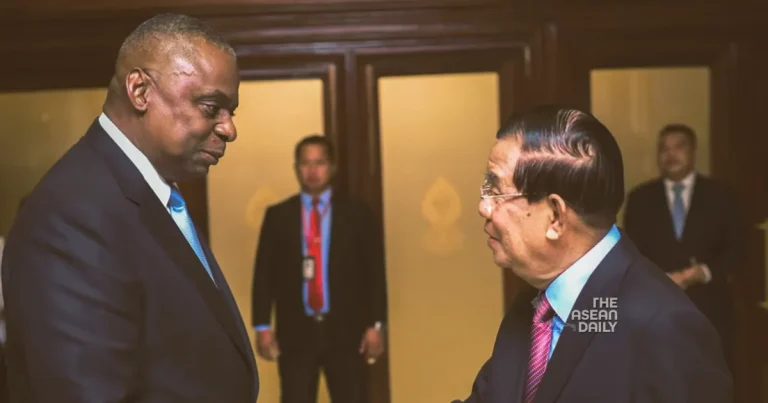4-6-2024 (PHNOM PENH) In a strategic move to reset strained ties with a staunch ally of Beijing, US Defense Secretary Lloyd Austin embarked on a visit to Cambodia on Tuesday, marking a pivotal moment in the delicate dance of regional diplomacy. The trip comes as Washington seeks to counter China’s burgeoning influence in the Southeast Asian nation, where billions of dollars have been poured into infrastructure investments under the former leadership of Hun Sen.
For years, the relationship between the United States and Cambodia has been on a downward spiral, with Washington voicing concerns over a key Cambodian naval base that is undergoing upgrades by Beijing. The US fears that this facility could be used to bolster China’s influence in the strategically vital Gulf of Thailand, further tilting the balance of power in the region.
Arriving in Phnom Penh from the Shangri-La Dialogue in Singapore, Austin’s one-day visit aims to “explore opportunities to deepen our bilateral defence relationship,” as he himself stated on the social media platform X. This overture comes at a critical juncture, with Cambodia’s political landscape undergoing a significant transition.
Austin’s first meeting was with the nation’s former leader, Hun Sen, who stepped down in August after nearly four decades at the helm. He is also scheduled to hold talks with Hun Manet, the newly appointed Prime Minister and son of the erstwhile strongman, in a symbolic gesture of continuity and potential reconciliation.
The visit carries added significance as both Austin and Hun Manet share a common bond – they are both alumni of the prestigious United States Military Academy at West Point. Austin graduated in 1975, while Hun Manet followed in his footsteps in 1999, a connection that could prove instrumental in fostering mutual understanding and paving the way for a renewed partnership.
Cambodian foreign ministry spokesperson Chum Sounry acknowledged the importance of Austin’s visit, describing it as “another good chance to advance ties and relations of the two countries.” This sentiment echoes the broader aspirations of both nations to navigate the complex geopolitical landscape and find common ground amidst competing regional interests.




